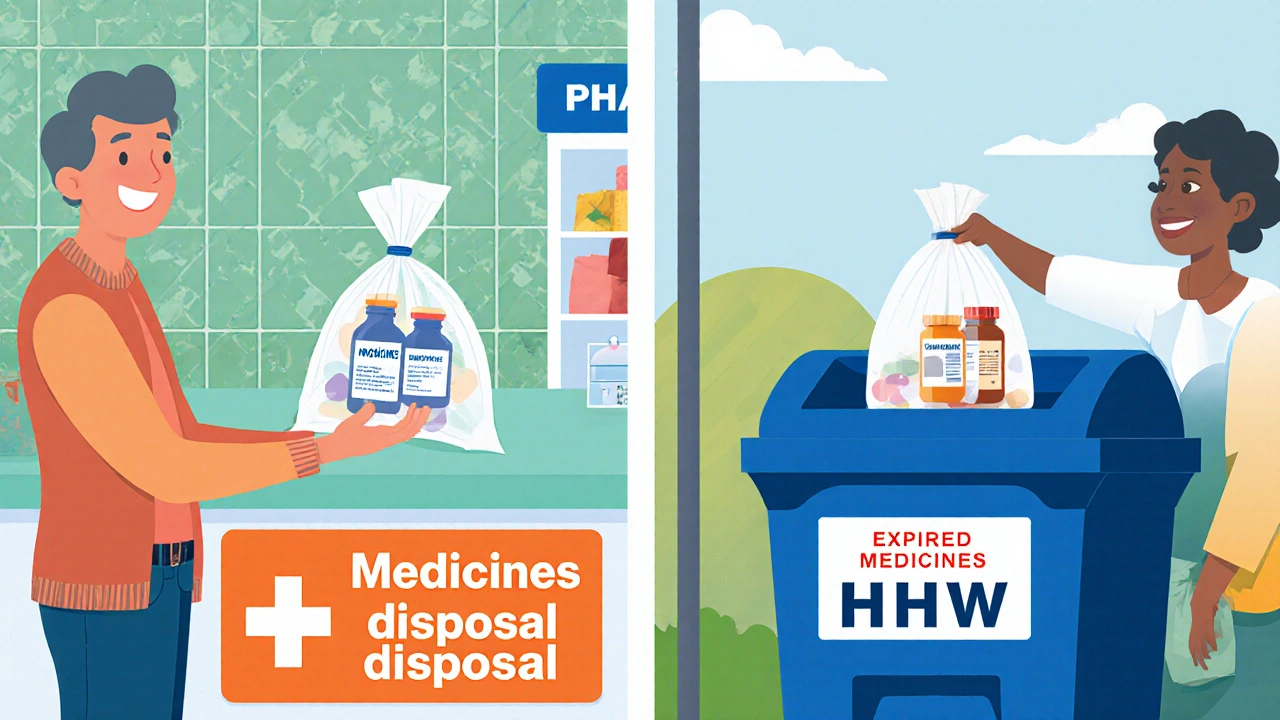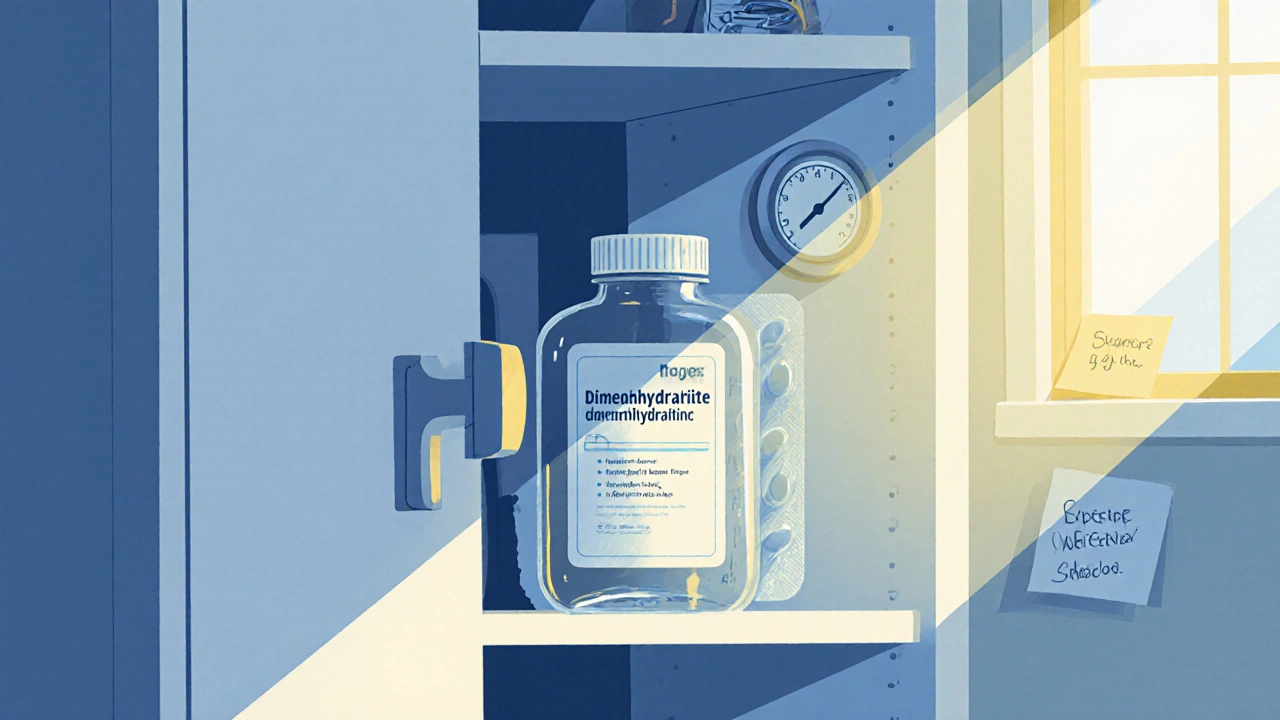Dimenhydrinate Shelf Life Calculator
Calculate Remaining Potency
Estimate how long your Dimenhydrinate remains effective based on storage conditions.
Safety Recommendation
Quick Takeaways
- Keep Dimenhydrinate in a cool, dry place away from direct sunlight and children.
- Label any leftovers with the purchase date; most tablets stay potent for up to 2 years.
- Never flush tablets; use a pharmacy take‑back scheme or follow local household hazardous waste guidelines.
- Check the UK Medicines Act for legal disposal routes and follow NHS recommendations.
- Keep the original packaging until you’re ready to discard it, then recycle safely.
Dimenhydrinate is a widely‑available over‑the‑counter antihistamine that blocks histamine receptors to prevent motion‑sickness and relieve nausea. While it’s handy in a travel bag, storing it incorrectly or tossing it in the regular trash can create safety and environmental problems. Below is a practical, UK‑focused guide that walks you through the right way to keep this medication safe at home and dispose of it responsibly.
Why Proper Storage Matters
Dimenhydrinate loses potency when exposed to heat, moisture, or light. A study by the Royal Pharmaceutical Society (2023) showed that tablets stored above 30 °C for six months dropped about 15 % in efficacy. Besides losing effectiveness, poorly stored pills can degrade into compounds that irritate the stomach or cause allergic reactions.
Keeping the drug out of reach of children is another legal requirement under the UK Medicines Act. Accidental ingestion of even a single tablet can cause drowsiness, dry mouth, and, in rare cases, breathing difficulties for kids under six.
Ideal Storage Conditions
Follow these simple rules:
- Choose a pantry or cabinet that stays between 15 °C - 25 °C.
- Store the bottle away from the stove, dishwasher, or any damp area.
- Use the original blister pack or a sealed, airtight container to protect against humidity.
- Label the container with the Dimenhydrinate storage date and the expiry printed on the package.
- Check the expiry every six months; discard any tablets past the date.
Safeguarding the Home: Practical Tips
Here are some everyday habits that make a big difference:
- Child‑proof the cabinet: Install a latch if you have young children.
- Keep a small “medication log” on the fridge-note when you opened a new pack.
- If you travel, use a portable, insulated pouch to avoid heat exposure in a car.
- Never share your Dimenhydrinate with friends or relatives; every person’s health profile is different.

Legal Framework for Disposal in the UK
Under the UK Medicines Act, pharmacies are obliged to accept unwanted medicines for safe disposal. The NHS endorses two main routes:
- Pharmacy take‑back schemes - free and secure.
- Household hazardous waste collection - for large quantities or when a pharmacy is unavailable.
Flushing medicines down the toilet is illegal because it can contaminate water supplies and affect aquatic life.
Step‑by‑Step Disposal Methods
Choose the method that fits your situation. The table below summarises the pros and cons of each approach.
| Method | Pros | Cons | Typical Availability |
|---|---|---|---|
| Pharmacy take‑back | Safest, free, compliant with UK law | Needs a nearby pharmacy, may have limited drop‑off hours | All NHS‑registered pharmacies |
| Household hazardous waste (HHW) collection | Handles bulk waste, accepted by local councils | May require a scheduled collection day, possible small fee | Council‑run collection points |
| Mail‑back program | Convenient for remote areas | Shipping cost, need a pre‑paid envelope | Only offered by some private pharmaceutical recyclers |
**How to use a pharmacy take‑back:**
- Do not crush or dissolve the tablets.
- Place the entire bottle (or remaining tablets) in a sealed plastic bag.
- Bring the bag to any NHS pharmacy with a “medicines disposal” sign.
- The pharmacist will log the return and handle incineration in a controlled‑waste facility.
**Disposing via HHW collection:**
- Check your local council’s website for the next collection date.
- Seal tablets in a non‑transparent bag labeled “Expired medicines”.
- Place the bag in the designated HHW container on the scheduled day.
Environmental Impact - What Happens After Disposal?
When medicines enter landfills or sewage, trace amounts can leach into groundwater. A 2022 study by the Environment Agency found detectable levels of antihistamines in 9 % of river samples across England. Proper incineration in a controlled waste facility breaks down the active compounds, preventing environmental contamination.

Common Mistakes and How to Avoid Them
- Throwing tablets in the regular trash - they may end up in a landfill and eventually leach into soil.
- Mixing medicines with household waste without sealing - odors attract pests.
- Storing near heat sources - reduces potency and may cause chemical breakdown.
- Keeping expired tablets “just in case” - they become a safety hazard.
By following the steps above, you protect your family, stay within legal boundaries, and reduce environmental risk.
Mini‑FAQ
Can I flush Dimenhydrinate down the toilet?
No. Flushing any medication can pollute water supplies and is illegal under UK waste regulations.
How long does Dimenhydrinate stay effective when stored properly?
When kept in a cool, dry place, tablets retain full potency up to two years, matching the printed expiry date.
What should I do if I have a large amount of unused tablets?
Contact your local council for a bulk Household hazardous waste collection or arrange a private mail‑back service.
Is it safe to keep Dimenhydrinate in a bathroom cabinet?
Generally not. Bathroom humidity can cause tablets to absorb moisture, reducing effectiveness and potentially fostering mold growth.
Do I need a prescription to return Dimenhydrinate to a pharmacy?
No. Dimenhydrinate is an OTC product, and pharmacies accept it as part of their free take‑back service.
Next Steps
If you’ve just opened a new pack, start a simple log on your phone or fridge. Mark the purchase date, set a calendar reminder for the expiry, and note the nearest pharmacy with a take‑back box. When the medication is no longer needed, follow the disposal flow that best fits your schedule. Staying organized now saves you time, money, and the hassle of dealing with accidental ingestion or environmental fines later.


Comments
Jhoan Farrell
Thanks for the clear steps, especially the tip about sealing the bottles in a non‑transparent bag 👍. Keeping a simple log on the fridge is a genius hack!
October 21, 2025 at 19:29
Jill Raney
One cannot help but marvel at the bureaucratic labyrinth that governs even the most mundane of over‑the‑counter remedies; the NHS’s take‑back scheme, while well‑intentioned, smacks of a paternalistic overreach that subtly nudges citizens into a false sense of moral superiority. The very notion that a simple blister pack requires the same ceremonial reverence as a controlled substance is, frankly, an absurdity that belies the underlying power structures. Moreover, the emphasis on “cool, dry” storage conditions evokes a nostalgic yearning for Victorian‑era apothecary precision, as if our modern kitchens have been transformed into clandestine laboratories. It is also worth noting that the advice to label containers with purchase dates, while seemingly innocuous, serves as a quiet reminder of the omnipresent surveillance state that tracks every consumer interaction. The environmental statistics, though presented with scientific gravitas, conveniently omit the fact that pharmaceutical companies themselves are major polluters, cleverly diverting blame onto the unsuspecting public. 😒 In addition, the table comparing disposal options feels like a corporate PowerPoint slide, stripped of any genuine empathy for those who might lack easy access to a pharmacy. The mail‑back program, touted as “convenient for remote areas,” is often riddled with hidden fees that the average citizen might overlook. The HHW collection, while technically viable, presupposes a level of civic organization that many neighborhoods simply do not possess without significant municipal investment. One must also question the reliance on “controlled‑waste facilities” that are themselves shrouded in opacity, raising concerns about what truly happens to these incinerated compounds. The article’s reliance on the Royal Pharmaceutical Society study, albeit credible, does nothing to address the broader systemic issues of drug over‑prescription and waste generation at the source. Ultimately, the guide, though thorough, operates within a framework that prioritizes superficial compliance over substantive change, inviting the reader to perform a ritualistic dance of paperwork while the deeper ecological consequences remain untouched. The suggestion to keep the original packaging until disposal, while practical, also reinforces consumerist habits that encourage hoarding rather than mindful consumption. Furthermore, the recommendation to avoid bathroom cabinets overlooks the everyday reality for many households where space is at a premium. Readers are left with a checklist but no guidance on reducing future excess, which is the crux of sustainable medication management. In this context, the guide feels more like a compliance worksheet than an empowering roadmap.
October 28, 2025 at 17:09
Heather McCormick
Wow, another “government‑approved” disposal method, as if the NHS really cares about our freedom to toss pills wherever they please. If you’re living in the US, you’ll probably just throw them in the trash and call it a day, because who needs regulations? The whole thing is a massive waste of time.
November 4, 2025 at 15:49
Robert Urban
i get where you're coming from but honestly following a simple take‑back box is easier than dealing with all that drama
November 11, 2025 at 14:29
Stephen Wunker
Everyone loves the idea of “safe disposal,” yet nobody questions why we manufacture so many excess pills in the first place. The market pushes convenience, and we’re left cleaning up the philosophical mess. Maybe the real solution is to rethink consumption, not just the end‑of‑life steps.
November 18, 2025 at 13:09
Ryan Spanier
Indeed, the broader perspective you raise is valuable; encouraging responsible consumption alongside proper disposal can create a more holistic approach. Community education programs that highlight both aspects may prove effective in reducing waste at its source.
November 25, 2025 at 11:49
Abhinav Moudgil
Namaste! Your guide brilliantly blends practicality with environmental stewardship, and I especially appreciated the vivid analogy of “incineration as a controlled‑fire ballet.” Such expressive language makes the technical details memorable and motivates us to act responsibly.
December 2, 2025 at 10:29
Bradley Allan
Hold on-are we really expected to become pharmacists in our own homes!!!? The sheer drama of sealing pills in opaque bags, labeling dates, and performing a ceremonial drop‑off at the pharmacy is enough to make anyone feel like they’re starring in a soap opera!!! But fear not, dear readers, because the guide provides a script that turns this mundane task into an Oscar‑worthy performance!!!
December 9, 2025 at 09:09
Kyle Garrity
It’s so reassuring to see the step‑by‑step breakdown; I can picture myself actually following the log on my fridge. Small habits like these make a huge difference for families who worry about accidental ingestion.
December 16, 2025 at 07:49
brandon lee
yeah totally sounds easy enough just keep it cool and drop it off when you can
December 23, 2025 at 06:29
Joshua Pisueña
Great guide – it respects both safety and cultural diversity, reminding us that proper disposal is a universal responsibility.
December 30, 2025 at 05:09
Ralph Barcelos de Azevedo
While the guide is commendable, it must also stress that neglecting proper disposal is a moral failing that endangers our community and planet alike.
January 6, 2026 at 03:49
Peter Rupar
Honestly, if you cant even follow these simple steps youre basically contributing to a global crisis and i dont have time for idiots who ignore basic safety.
January 13, 2026 at 02:29
Nikita Shue
Yo, chill out. Yeah, disposal is important, but screaming at people won’t make them listen. Let’s keep it constructive and help each other out.
January 20, 2026 at 01:09
bill bevilacqua
This guide is over‑blown.
January 26, 2026 at 23:49